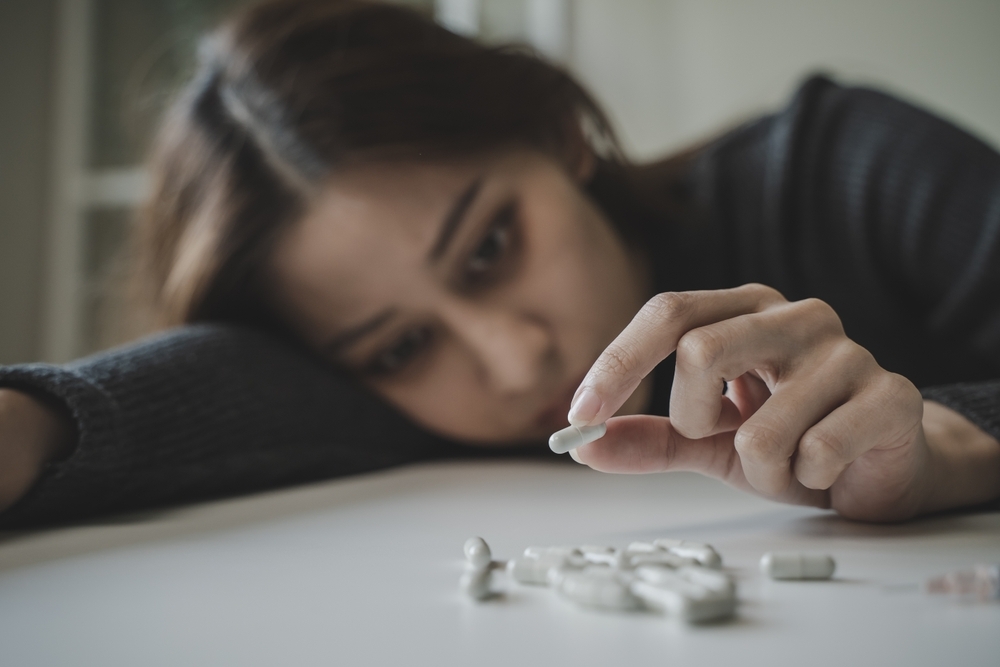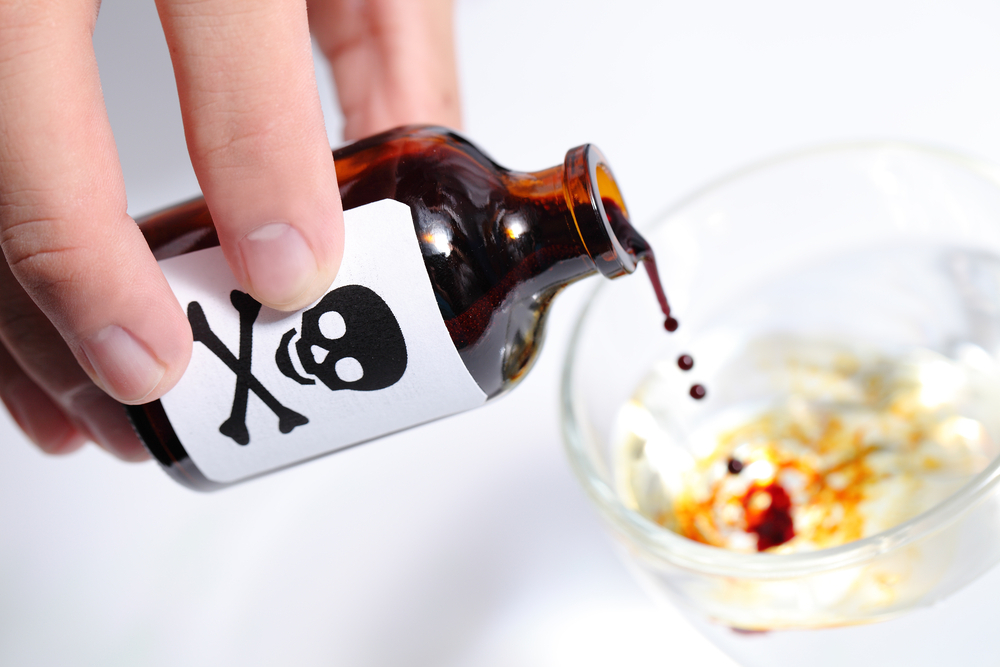Last Updated:
February 25th, 2025
Drug poisonings vary in severity. Some poisonings can be treated with appropriate medical intervention. Unfortunately, in some cases, drug poisoning can lead to death. In 2023, there were 5,448 fatal drug poisonings in England and Wales. This is a significant increase from the previous year, when 4,907 fatal overdoses were recorded.
Overdose is one of the biggest risk factors associated with substance abuse. Whilst, sadly, some overdoses are planned, there are many incidences where drug poisoning leads to accidental death. This indicates a high level of risky drug use not just across the UK but the world. Educating ourselves on drug poisoning is an integral part of safeguarding our health. This includes being aware of what increases the risk of drug poisoning and what we can do to prevent this from happening.
Drug poisoning
What is it?
Poisoning happens ‘when a person is exposed to a substance that can damage their health or endanger their life.’ A lot of substances, in large amounts, can be poisonous. One of the most common forms of poisoning is drug poisoning. This happens when someone consumes too much of a potentially toxic substance.
When we think of overdose, we may think of taking too many prescription medications. It is also possible, though, to overdose on illicit substances. The vast majority of the time, fatal drug poisonings involved more than one drug. This suggests that accidental poisoning is most likely to happen on occasions where drugs are being mixed.
Drug poisonings don’t only result in death. Some people can survive an overdose but experience serious health consequences afterwards. This can lead to life-long complications, such as brain damage or loss of limb function connected to oxygen loss.
Key statistics
Poisonings can be linked to many substances; however, there are some drugs that are most frequently mentioned in post-mortem reports. The Office compiled this data for National Statistics in an overview of drug poisonings in England and Wales.
Types of drugs
The data tracks how many deaths each kind of drug was associated with in 2023.
It found that opiates and cocaine were the most likely to be present, finding that:
- Opiates were involved in 2,551 deaths
- Cocaine was involved in 1,118 deaths
- Other drugs linked with high numbers of poisonings include:
- Tramadol
- Codeine
- Amphetamines
- Ecstasy
- Cannabis
- New psychoactive substances
- Benzodiazepines
- Zopiclone
- Antidepressants
- Antipsychotics
- Paracetamol
This suggests that some of the most common drugs linked with overdoses are painkillers, psychiatric and sleeping medications and stimulant drugs.
Demographics
While all individuals can experience drug poisoning, data suggests that fatal overdoses are more common among specific groups.
Fatal drug poisonings were:
- More common in males than females
- Most common in those aged 40 to 49
- Highest in the Northeast of England
- Lowest in London
Why does it happen?
Drug poisonings happen when someone takes too much of a toxic substance. Substances that are labelled as toxic are harmful to human health in certain quantities. The amount of a substance that is toxic changes from drug to drug.
There are several factors that can influence the toxicity of a drug – and, therefore, increase the likelihood of a fatality.
Drug interactions
Some substances do not interact well together. These cases are sometimes known as contraindications. For example, certain medications are not prescribed for asthma because they can negatively impact the respiratory system.
Mixing drugs is a risk in any combination.
For example, there may be a risk of drug poisoning when you are engaging in polydrug use. This could look like taking any of the following combinations together:
- Prescription medications and alcohol
- Prescription medications and illegal drugs
- A variety of prescription medications
- Illegal drugs and alcohol
Many people overdose when using illicit substances due to lack of knowledge of what they are taking. This is because the illegal drug market is not transparent, leading people to take drugs that contain additional (or totally different) substances to what they have been sold.
Quantities and strengths
A big risk of poisoning lies in the strength and amounts of the drugs we are taking. This can be a factor with both regulated and non-regulated substances. Non-regulated substances often aren’t labelled, and therefore, we can’t be certain what they contain and in what quantities. This can especially be the case when drugs are being shared or communally used.
You may have used a drug in the past and responded well. However, the lack of quality control in the illegal drug market means that this experience cannot always be guaranteed.
Similarly, prescription medications are allocated in specific strengths and amounts. Medical professionals provide strict advice on how to use medications safely in order to avoid poisoning.
Preventing drug poisoning
According to the NHS, several thousands of deliberate poisonings happen each year. This type of poisoning is considered to be a type of self-harm. However, there are hundreds of accidental overdoses each year.
There are ways to reduce the risk of this occurring. These include:
- Not taking drugs from people you do not know
- Not mixing substances
- Refraining from drinking when using drugs
- Avoiding drinking when it is medically advised to do so
- Not ‘bingeing’ drugs
- Use smaller quantities
- Not sharing prescriptions
- Follow advice given from medical professionals
- Do not take drugs whilst you are alone or in an isolated area
- Keep drugs and medications in secure cabinets
- Keep medications out of access of vulnerable individuals
- Take medications with water, not alcohol
- Ensure you take significant breaks between uses – do not ‘stack’ drugs
- Get support for drug dependency
Signs of drug poisoning
Drug poisoning can cause a range of different symptoms.
These can vary depending on what substances an individual has taken. There are, however, keyways to identify poisoning. These include:
- Vomiting
- Pain in the abdomen
- Confusion
- Feeling sleepy
- Loss of consciousness
If the poisoning has caused serious ill effects, you may also notice seizures, fainting and unresponsiveness.
What to do in an emergency
If you come across someone and suspect that they have drug poisoning, then the most important thing to do is to check if they are responsive.
- Try to help them sit or lie down comfortably
- Ask what they have taken
- Try to help them stay calm
- Encourage them to breathe slowly
- If they worsen, call 999
- Open their airway
- Place them in the recovery position if possible
- Check their breathing
- Call 999
- Gather any boxes, packets or substances to give to medical professionals
- Stay with them
- Keep checking their pulse, breathing and response level
- Reassure them
- Force them to vomit
- Force them to eat
- Leave them unattended
- Give them other medication
- Increase their level of panic
Start your route to addiction recovery
The risks linked to drug abuse can be alarming. If you are concerned that your drug use is starting to impact your health, then it may be time to access support. From outpatient programmes to supported detoxes and residential care, rehab for drug addiction comes in all forms. At UKAT, there is an appropriate route to recovery for everyone. Contact us today to seek judgment-free, specialist advice from a member of our admissions team.
(Click here to see works cited)
- https://www.ons.gov.uk/peoplepopulationandcommunity/birthsdeathsandmarriages/deaths/bulletins/deathsrelatedtodrugpoisoninginenglandandwales/2023registrations
- https://www.ons.gov.uk/peoplepopulationandcommunity/birthsdeathsandmarriages/deaths/bulletins/deathsrelatedtodrugpoisoninginenglandandwales/2023registrations
- https://www.nhs.uk/conditions/poisoning/
- https://www.ons.gov.uk/peoplepopulationandcommunity/birthsdeathsandmarriages/deaths/bulletins/deathsrelatedtodrugpoisoninginenglandandwales/2023registrations
- https://www.ons.gov.uk/peoplepopulationandcommunity/birthsdeathsandmarriages/deaths/bulletins/deathsrelatedtodrugpoisoninginenglandandwales/2023registrations
- https://www.ons.gov.uk/peoplepopulationandcommunity/birthsdeathsandmarriages/deaths/bulletins/deathsrelatedtodrugpoisoninginenglandandwales/2023registrations
- https://www.ons.gov.uk/peoplepopulationandcommunity/birthsdeathsandmarriages/deaths/bulletins/deathsrelatedtodrugpoisoninginenglandandwales/2023registrations
- https://pmc.ncbi.nlm.nih.gov/articles/PMC4707670/
- https://www.bbc.co.uk/news/uk-england-bristol-61409174
- https://www.nhs.uk/conditions/poisoning/
- https://www.sja.org.uk/get-advice/first-aid-advice/poisoning/narcotics-drug-poisoning/?srsltid=AfmBOorj6HPjc2vjf_60owFFOzetOzaEJFU0lZFVCqOwkZcbyz5Dj5Gq


